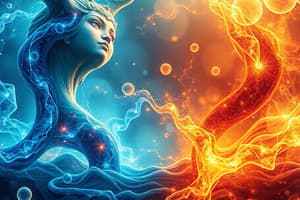Podcast
Questions and Answers
What is the role of the oxygen atom in the combustion of methane?
What is the role of the oxygen atom in the combustion of methane?
- It remains unchanged during the reaction.
- It is oxidized by gaining electrons. (correct)
- It is reduced by losing electrons.
- It acts as the reducing agent.
In the oxidation of glucose during cellular respiration, what is released as a byproduct?
In the oxidation of glucose during cellular respiration, what is released as a byproduct?
- Oxygen
- Nitrogen
- Methane
- Water (correct)
Which statement is true about the electron transfer in redox reactions?
Which statement is true about the electron transfer in redox reactions?
- Reduction involves losing electrons.
- Electrons move from the reducing agent to the oxidizing agent. (correct)
- The reducing agent gains electrons.
- Oxidation involves gaining electrons.
What happens to the carbon atom in methane during combustion?
What happens to the carbon atom in methane during combustion?
How do electrons behave during the combustion of methane?
How do electrons behave during the combustion of methane?
Flashcards are hidden until you start studying
Study Notes
Oxidation and Reduction
- Reduction refers to the gain of electrons, while oxidation indicates the loss of electrons.
- In the reaction between sodium (Na) and chlorine (Cl) to form table salt (NaCl):
- Sodium (Na) is oxidized, losing an electron to form Na+.
- Chlorine (Cl) is reduced, gaining an electron to form Cl-.
- The general equation for electron transfer can be expressed as:
Xe- + Y → X + Ye-, where:- Xe- acts as the reducing agent (electron donor).
- Y serves as the oxidizing agent (electron acceptor).
Methane Combustion as an Energy-Yielding Redox Reaction
- Methane (CH4) reacts with oxygen (O2) to produce carbon dioxide (CO2), water (H2O), and releases energy.
- Reactants:
- CH4 features carbon which shares its electrons nearly equally with hydrogen.
- O2 consists of two oxygen atoms sharing electrons equally among themselves.
- Products:
- CO2: Carbon shares electrons less equitably with oxygen, indicating the loss of electrons.
- H2O: Oxygen shares electrons more evenly with hydrogen, showing a gain of electrons.
- In this combustion reaction, carbon in methane is oxidized, while the oxygen in O2 is reduced.
- Energy release occurs as electrons shift towards more electronegative oxygen atoms.
Oxidation of Organic Fuel Molecules During Cellular Respiration
- The oxidation reaction for glucose during cellular respiration can be represented as:
C6H12O6 + 6O2 → 6CO2 + 6H2O + energy. - Glucose (C6H12O6) is oxidized during this process.
- Oxygen (O2) is reduced, accepting electrons from glucose.
- This electron transfer results in a reduction of energy, allowing the released energy to be harnessed for ATP synthesis.
Studying That Suits You
Use AI to generate personalized quizzes and flashcards to suit your learning preferences.




